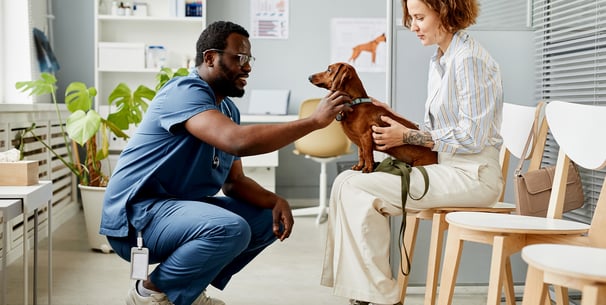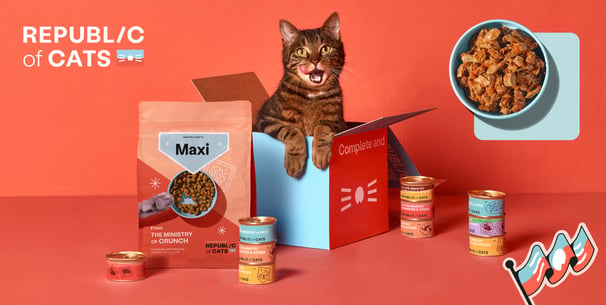You may not always feel like you're in sync with your pet, and that's fine. We've collected all the information we think might help you to reach peak pet parent. Subscribe to get the freshest posts, straight to your inbox.
Preventing Holiday Havoc - Christmas Food Hazards for Pets
Index:



Introduction
The holiday season is fast approaching - bringing joy and excitement to both people and pets. However, amidst the cosy Christmas films, cheeseboards and gift-giving, pet owners should be mindful of potential hazards for their companions over this busy, fun-filled period.
Every Christmas, the veterinary team at Joii receives numerous calls from concerned pet parents whose beloved pets have ingested inappropriate items. We’re talking about everything from Christmas chocolates and mince pies to sellotape and string from gift wrapping.
To ensure a safe and merry Christmas for your pets, we’ve created a guide all about Christmas hazards and the steps to take if your pet ingests something harmful.
High-risk food hazards for pets
Grapes



We all know grapes are poisonous for pets, right? But did you know just how many Christmas foods contain these dangerous ingredients? Below is a list of dangerous fruit-related items that contain grapes or their dried form of raisins, sultanas and currants.
Mince pies
Stollen
Christmas cakes
Christmas pudding
Trifles
Fruit cake
Panettone
Sweets such as chocolate-covered raisins
Dr Deborah Brown, a veterinary surgeon from Joii, adds, “It can take just one single raisin to cause life-threatening kidney failure. Symptoms start within 24 hours and include loss of appetite, vomiting, diarrhoea, extreme tiredness and tummy pain.”
She also recommends calling a vet immediately if your pet eats any kind of food containing grapes, sultanas or raisins.
Chocolate



As mentioned in one of our previous blog posts, “Can dogs eat white chocolate?” chocolate contains theobromine making it very dangerous for both dogs and cats alike. It can cause life-threatening damage to the heart, nervous system and kidneys.
At Christmas, there tends to be a higher availability of chocolate products, such as boxes of chocolates, chocolate-covered treats, and festive desserts. With more chocolate around, there's a greater chance that pets may come into contact with it. We therefore encourage you to keep your pets away from:
Selection boxes
Chocolate Christmas tree decorations
Hot chocolate and cocoa powder
Chocolate truffles
Yule logs
Chocolate salami
Advent calendars
The level of risk from chocolate varies based on the type and quantity of chocolate consumed by your pet. Dark chocolate, with a higher cocoa solids percentage compared to milk chocolate, poses a greater risk. The risk increases with the strength of the dark chocolate.
Initial symptoms may manifest as restlessness, excitement, increased thirst, and vomiting. These early signs may be followed by more serious symptoms such as breathing difficulties and eventual collapse.
Christmas turkey bones
Another food item Dr Deborah Brown encourages pet owners to avoid over the Christmas period is turkey and chicken, most notably, the bones from such meats.
Both raw and cooked turkey and chicken bones pose a threat to pets. Cooked bones, in particular, tend to splinter, presenting a risk of serious injury as they traverse the intestinal tract. Bones also pose a choking hazard and may become lodged in the intestine.
In addition to the mentioned risks, raw bones carry the same dangers and may also be a source of Salmonella, a prevalent cause of food poisoning.
Children’s sweets



Children’s sweets, gummies, low-sugar preserves and artificial sweeteners can be super toxic for cats and dogs. When lots of children’s gifts contain sweets, Christmastime can be a cause of concern if you have both children and pets living together!
Xylitol is a sugar substitute present in numerous human foods and medications. While cats typically tolerate it well and tend to avoid sweet substances, Xylitol poses a severe threat to dogs.
Ingesting Xylitol can lead to a rapid and perilous decrease in blood sugar levels within an hour, potentially resulting in life-threatening liver damage depending on the quantity consumed by the dog. Early symptoms include weakness, vomiting, tremors, fits, and eventual collapse.
Eating the inedible



Whilst pet owners immediately think of food as the only hazard at Christmas, Dr Deborah Brown encourages owners to remember the non-edible stuff too.
Gift wrap, turkey/chicken bones, Sellotape, plastic Santas, festive tree ornaments, and the occasional chewed-up toy bit have the potential to become lodged in your furry friend's stomach. If these items are indigestible, they simply remain there, obstructing the passage of anything, including food which can be fatal. This situation may necessitate significant and expensive surgical intervention for removal.
Moderate risk hazards for dogs and cats
Sage and onion stuffing and soup ingredients



Whilst winter is the season of soups and all things savoury for us, the same can’t be said for our pets. Vets at Joii see many cases of toxic ingestion from ingredients such as onions, garlic, leeks and chives which (cooked or raw) can cause severe tummy upsets, tiredness, weakness, breathing difficulties and eventual collapse.
Dr Brown writes, “Eating more than 15-30 mg/kg can cause damage to your pet’s blood cells leading to potential jaundice and anaemia within 2 to 5 days.”
Chestnut stuffing, bowls of nuts and nut roasts
Many owners are unaware that nuts can be harmful to pets, most notably, macadamia nuts and chestnuts - both of which are very popular over the festive period. Symptoms vary depending on how many nuts are consumed but can include tummy upset, muscle weakness, hyperthermia and breathing problems. Very high doses can lead to kidney damage so it’s important to seek immediate veterinary care if you believe your pet has ingested nuts of any kind.
As well as being toxic, whole nuts also pose a very high choking risk to both cats and dogs. Nuts can also become lodged in the intestine which Dr Brown adds, “requires major surgery to remove them.”
Cooking sherry, whiskey, Baileys, wine and cocktails
Alcohol, in all its forms, poses a significant threat to pets, with heightened risks during the festive Christmas season. Pets are particularly vulnerable to the toxic effects of alcohol, and even small amounts can lead to serious health issues.
Symptoms of alcohol poisoning in pets, which can be especially pertinent during Christmas celebrations, include vomiting, dizziness, and unsteadiness. Pets may also experience difficulty breathing, which can escalate into a life-threatening situation.
As a pet owner, it’s crucial to be vigilant and ensure that alcoholic beverages are kept out of reach of your animals at all times. Accidental ingestion of alcohol, whether from spilt drinks or improperly stored items, can result in rapid onset of symptoms. If a pet shows signs of alcohol poisoning, immediate veterinary attention is essential to prevent further complications and ensure their well-being.
What to do if your pet eats something they shouldn’t



If your pet is eating something they shouldn’t, the first thing to do is to remove any further opportunity for harm and clear up anything left immediately. Dr Brown further recommends distracting your pet with a favourite toy or treat if they are chewing on something harmful.
The next step is to call a vet without delay. If you’re a Waggel member, you can gain direct access to an online vet at Joii simply by being a policyholder. All you need to do is download their app and sign up. By choosing Waggel as your insurance provider you can be connected with a vet in just minutes who’s on hand to address any queries or concerns.
Safe treats at Christmas



Though it seems there is a long list of no-gos when it comes to pet-safe food at Christmas, you’ll be pleased to know there are lots of tasty treats your pet can eat including vegetables and fruits.
Unless your pet is allergic, a piece of roast turkey (without bones and trimmings) is sure to be appreciated. Alongside this, Brussels sprouts (no nuts, bacon or other additions), sweet potatoes, carrots, green beans and celery are also pet-safe meaning your most cherished companion can also join in the festive fun.
There are, of course, a plethora of treats available and marketed towards pets at Christmas. We recommend avoiding things such as rawhide and instead focussing on dental care, looking for treats endorsed by the Veterinary Oral Health Council. Dr Brown says, “[these treats] will help keep your pet’s mouth and teeth in the best health at Christmas.”
What other foods are safe?
At Waggel, we’re pet owners too and have spent countless hours searching online for “Can my pet eat…”. To stop you from doing the same our diet experts have spent time crafting articles that answer all of your food-related questions. From gravy to vegan dog food, we’ve got it all covered.
Take a look below for more of our food blogs:
Conclusion



In conclusion, while the festive season brings joy and celebration, it also introduces potential hazards for our beloved pets. From the dangers of chocolate and the toxicity of certain bones to the risks associated with alcohol consumption, we pet owners must be vigilant and proactive in safeguarding our furry friends during Christmas.
The allure of holiday treats, decorations, and festivities can inadvertently expose pets to harmful substances, leading to serious health complications. Recognising the signs of ingestion and seeking prompt veterinary care is essential for ensuring a safe and joyful holiday season for our pets.
By understanding and addressing these Christmas food hazards, we can create a secure environment that allows everyone to enjoy the holiday festivities without compromising the well-being of our four-legged companions!
Waggel Pet Insurance
Need more help? You're in luck if you're a Waggel Pet Insurance member. Along with our excellent coverage, we offer access to a 24/7 online vet to answer all your sticky questions, especially if you need grooming assistance.
Not a member? Why not get a quote now and cover your furry friend for a range of illnesses, all while enjoying our amazing perks and rewards.
Want more like this?
Get updates from us with helpful info, advice, answers to frequently asked questions and much more.
Index:
Related posts:
Get your quote
Along with our excellent coverage, we offer access to a 24/7 online vet to answer all your sticky questions.





